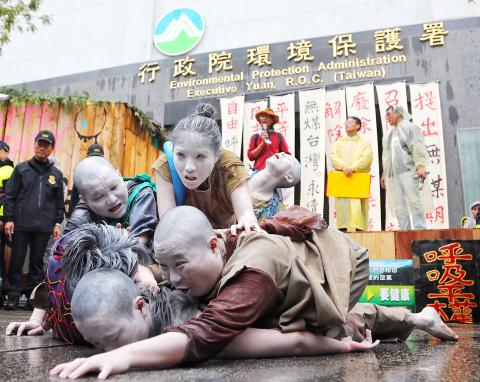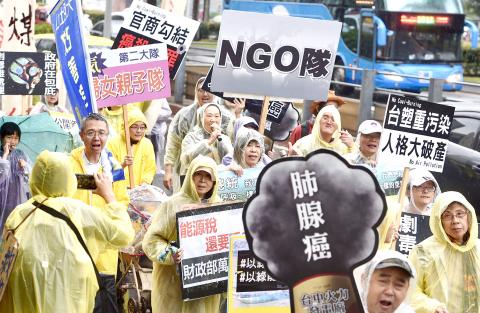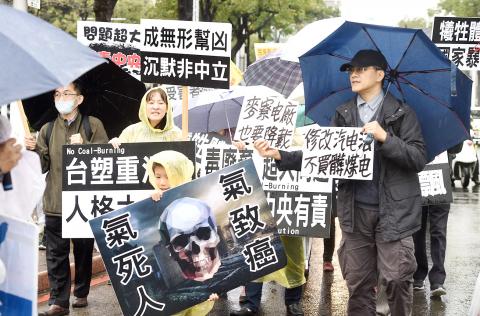Environmental groups joined forces and braved the rain in Taipei yesterday to march against air pollution and call for measures against it.
The march was co-organized by more than a dozen groups, including Air Clean Taiwan (ACT), South Taiwan Air Clear, the National Federation of Teachers’ Unions, the Alliance for the Rescue of Datan Algae Reefs, the Taiwan Academy of Ecology and the Taiwan Tree Protection Coalition.
Several political parties were also represented at the march, including the New Power Party, the New Party and the Taiwan People’s Party.

Photo: CNA
At about noon, demonstrators gathered outside the Environmental Protection Administration building, where the vice presidential candidates of the Democratic Progressive Party (DPP) and the Chinese Nationalist Party (KMT) spoke to them before the march began.
The DPP’s candidate, former premier William Lai (賴清德), said that during his premiership from September 2017 to January the Executive Yuan’s National Council for Sustainable Development released the nation’s first Voluntary National Review.
He mentioned a number of proposals, including closer collaboration between the council and private groups and businesses; a reassessment of the Greenhouse Gas Reduction and Management Act (溫室氣體減量及管理法); and the development of a timetable for carbon neutrality in Taiwan, for the future.

Photo: Peter Lo, Taipei Times
However, some demonstrators demanded “promises” instead of “empty words” as Lai left the scene.
Shortly after Lai’s departure, the KMT’s vice presidential candidate, former premier Simon Chang (張善政), who served during former president Ma Ying-jeou’s (馬英九) second term, spoke to the crowd.
Chang claimed that former Academia Sinica president Lee Yuan-tseh (李遠哲) quoted President Tsai Ing-wen (蔡英文) as saying that “solving [the problem of] air pollution is the next generation’s business.”

Photo: Peter Lo, Taipei Times
Chang said “we 1,000 percent disagree.”
Chang said his campaign’s energy policy is to “carry out the results of last year’s two referendums.”
“One is to reduce coal-fired power generation each year, and the second is to ‘use nuclear to support green,’” he said. “We also support green energy, but we do not support an impetuous [shift to] green energy.”
However, Chang’s mention of “using nuclear to support green” appeared to upset some demonstrators, who interrupted him by saying they wanted a “nuclear-free homeland.”
After a series of scheduled speeches by group representatives, the demonstrators at about 1:30pm began their march toward Liberty Square, arriving at about 3pm.
They shouted slogans such as “The greater south wants health," “Breathing needs equal rights,” and “Coal-free Taiwan, sustainable health” as they marched.
They also held signs that read, “Nuclear-free, coal-free homeland,” and “Legalized harm, state violence,” among other messages.
For the march, ACT listed four major demands, including the hosting of a “climate conference” and the abolition of the “centralization of energy.”

SECURITY: As China is ‘reshaping’ Hong Kong’s population, Taiwan must raise the eligibility threshold for applications from Hong Kongers, Chiu Chui-cheng said When Hong Kong and Macau citizens apply for residency in Taiwan, it would be under a new category that includes a “national security observation period,” Mainland Affairs Council (MAC) Minister Chiu Chui-cheng (邱垂正) said yesterday. President William Lai (賴清德) on March 13 announced 17 strategies to counter China’s aggression toward Taiwan, including incorporating national security considerations into the review process for residency applications from Hong Kong and Macau citizens. The situation in Hong Kong is constantly changing, Chiu said to media yesterday on the sidelines of the Taipei Technology Run hosted by the Taipei Neihu Technology Park Development Association. With

CARROT AND STICK: While unrelenting in its military threats, China attracted nearly 40,000 Taiwanese to over 400 business events last year Nearly 40,000 Taiwanese last year joined industry events in China, such as conferences and trade fairs, supported by the Chinese government, a study showed yesterday, as Beijing ramps up a charm offensive toward Taipei alongside military pressure. China has long taken a carrot-and-stick approach to Taiwan, threatening it with the prospect of military action while reaching out to those it believes are amenable to Beijing’s point of view. Taiwanese security officials are wary of what they see as Beijing’s influence campaigns to sway public opinion after Taipei and Beijing gradually resumed travel links halted by the COVID-19 pandemic, but the scale of

A US Marine Corps regiment equipped with Naval Strike Missiles (NSM) is set to participate in the upcoming Balikatan 25 exercise in the Luzon Strait, marking the system’s first-ever deployment in the Philippines. US and Philippine officials have separately confirmed that the Navy Marine Expeditionary Ship Interdiction System (NMESIS) — the mobile launch platform for the Naval Strike Missile — would take part in the joint exercise. The missiles are being deployed to “a strategic first island chain chokepoint” in the waters between Taiwan proper and the Philippines, US-based Naval News reported. “The Luzon Strait and Bashi Channel represent a critical access

Pope Francis is be laid to rest on Saturday after lying in state for three days in St Peter’s Basilica, where the faithful are expected to flock to pay their respects to history’s first Latin American pontiff. The cardinals met yesterday in the Vatican’s synod hall to chart the next steps before a conclave begins to choose Francis’ successor, as condolences poured in from around the world. According to current norms, the conclave must begin between May 5 and 10. The cardinals set the funeral for Saturday at 10am in St Peter’s Square, to be celebrated by the dean of the College